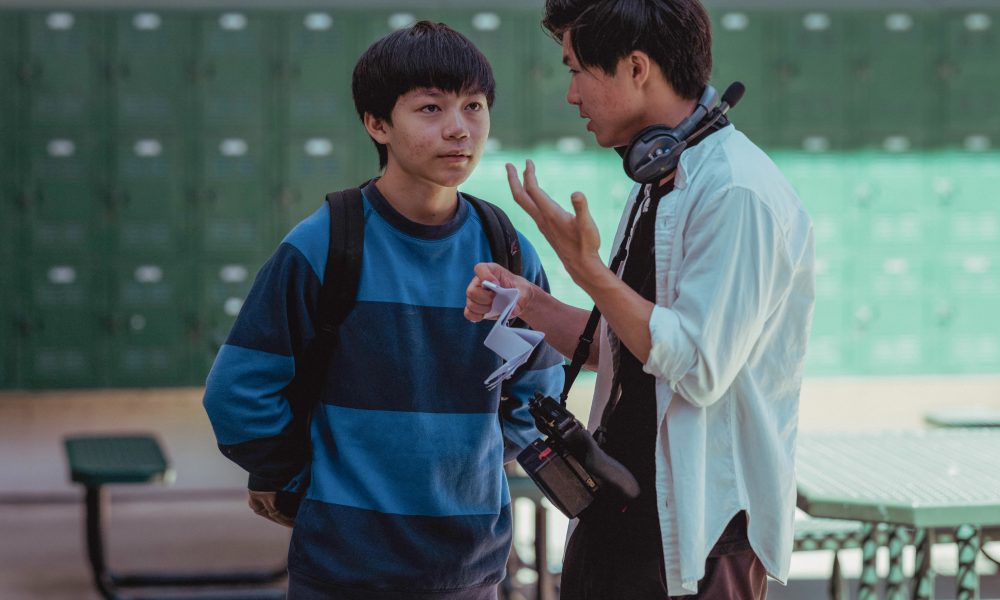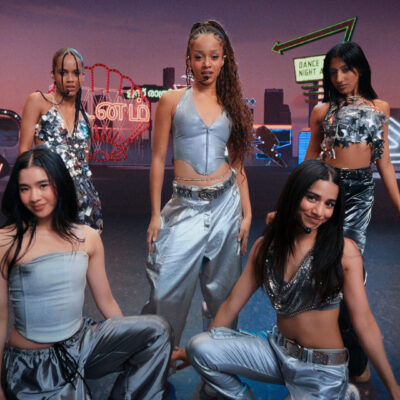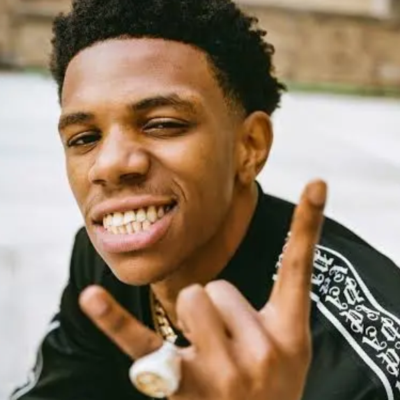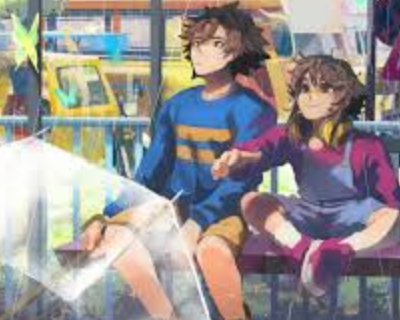Dìdi Just Became My Favorite Teen Movie – A Night With Sean Wang
Film director Sean Wang released Dìdi on July 26th. Although it only hit specific theaters, one of those places was Boston’s Coolidge Theater. I had never been, so I was lost for a bit. But once I got settled, I was ready for the film. The theater was very old school, which I enjoyed. Even though the seats didn’t recline, they were comfy: They sat deep and made me feel like I was in my own little box. The entire theater was large with nice mural art on the ceiling. It also had a stage with a large screen behind it.
Dìdi is about a first generation Taiwanese boy in the Bay Area in 2008 enjoying his summer before entering high school. The film follows him doing and learning things he can’t grasp from his family during this awkward time. Before the movie started, we were given an introduction to Sean Wang and the making of his movie. Half of us were there because we heard about the film, and the other half were there because they just wanted to watch a new movie. In the end though, everyone loved Wang’s film.
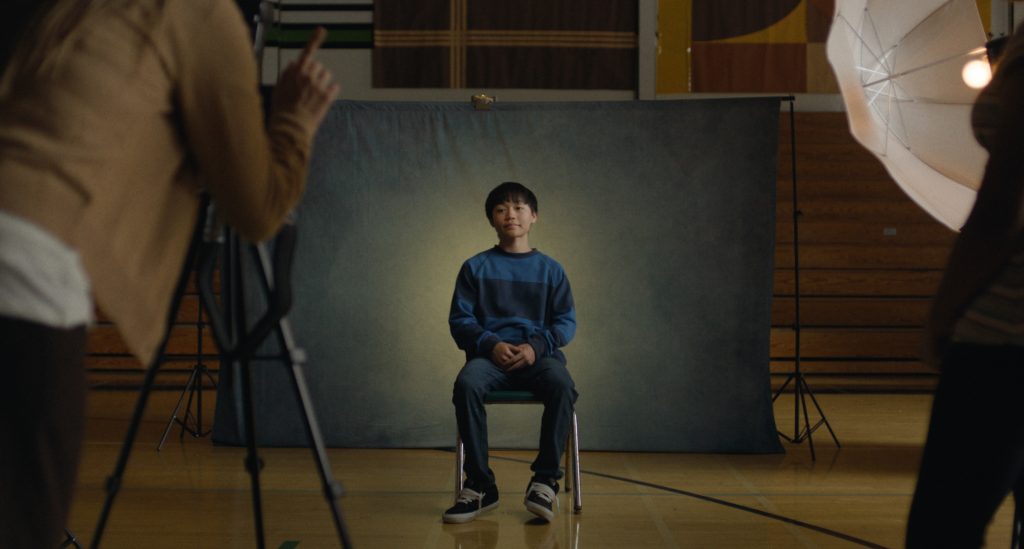
When the movie began, I immediately fell for Dìdi. From the start, every character introduced is established well and every relationship is made clear. The main character, Chris, goes by WangWang from his friends and Dìdi by his family. We see the “get out of my room!,” and, “Mom, [little brother] called me a bad word!” relationship between Dìdi and his older sister. We see a mother who is trying to be a mediator while the family’s sweet – but nagging – grandmother is giving inputs that may or may not be wanted. We see friends say stupid things and do stupid things to each other because they are little pubescent children with a free summer. The movie showcases mistakes that teens make – ones that can be taken back and others that can’t – along with lessons in friendships and familial love. Wang made this movie in a way that anyone can connect with its characters. I connected with Dìdi and his friends because I too was once a littler child. I could empathize with his mother as you see her supporting her family – despite others not appreciating her – because I’ve seen the women in my family experience the same thing. Even not being a first generation American citizen, I didn’t feel like I missed out on things and even connected with a few of the cultural moments despite not being Taiwanese.
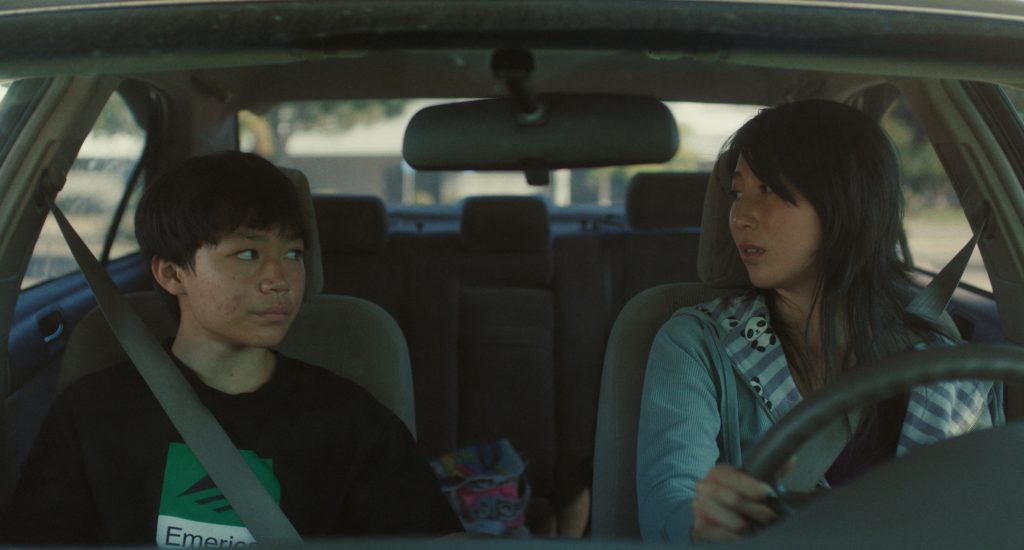
When Wang was directing this movie, he thought about one quote: “If you can make them laugh, you can make them cry.” That’s exactly what he did. What was particularly special about this movie was its emotional transitions. If we split the movie into three sections, the first section was full of humor, the second had a fair balance between humor and life lessons, and the last section ended the movie off with the impact of its life lessons. While many movies struggle with ruining serious/emotional moments with humor, Wang made it so that wasn’t the case. Dìdi, just like all of Wang’s previous works, feels natural. Everything about Dìdi feels true to life. The film’s easy conversations with bits of humor made it so that a scene’s emotional impact was never devalued. When there were extremely serious moments, it stayed that way, and the next scene continued on the same note. I loved that Sean Wang truthfully encapsulated a teenager’s life and what they do, showing how not much has changed since 2008.
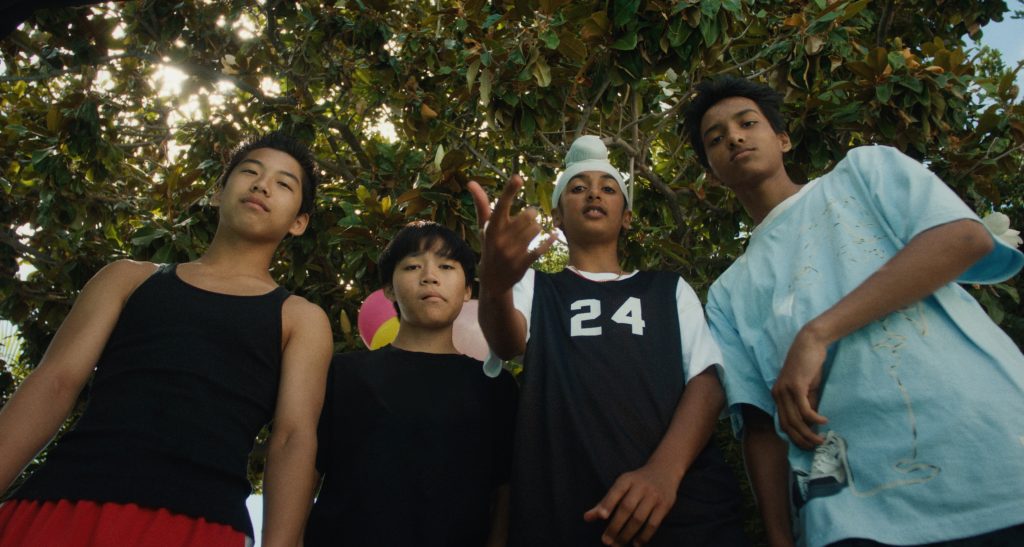
After the movie, there was a Q&A panel hosted by the Coolidge Theater where Wang was interviewed. Here’s how it went:
How much of the film is based on actual events versus inspired by?
Sean Wang: It’s all a little nebulous. Take what you will…There’s one thing I love about watching movies that are kind of in that bunch of personal storytelling…I do like the experience as an audience member, and I think to myself, “When does the life of the filmmaker and when does the character or the movie begin?”
Everything started from a real place, but once you start writing and thinking about the themes of the story and what the story needs to do, and how to make it a narrative and not just events, then you start combining things, you start drawing things or fictionalizing, you start tearing things away. And it really just ends up becoming its own thing.
Early on, they started to just really become characters. Obviously, like Chris, you can draw the parallels to me, but even now I look at Chris, and I certainly see myself in him, but to me, I see a character of, or, maybe a version of me. But hopefully, he’s a version of everybody in this room. You can hopefully see a version of yourself.
Art really is medicine, and I’m curious how making this film was medicine to you?
It’s both candy and medicine. It was healing in the sense that it wasn’t just me trying to unpack certain things about my childhood. It wasn’t like a trauma dump. It was hopefully an exploration of joy at the same time, and innocence and irreverence. This movie is just as inspired by things like Jackass that made me and my friends laugh as it is trying to explore the loneliness of childhood. The thing I thought a lot about while making this movie
Liz Hannah said, “If you can get them to laugh, they’ll trust you to try” – the best advice she took from Spielberg. If we can kind of bring in the irreverence and comedy and joy of adolescence, then, hopefully, we can also get to the things that are tougher to stomach and stuff that was harder to write and also hopefully healing to me.
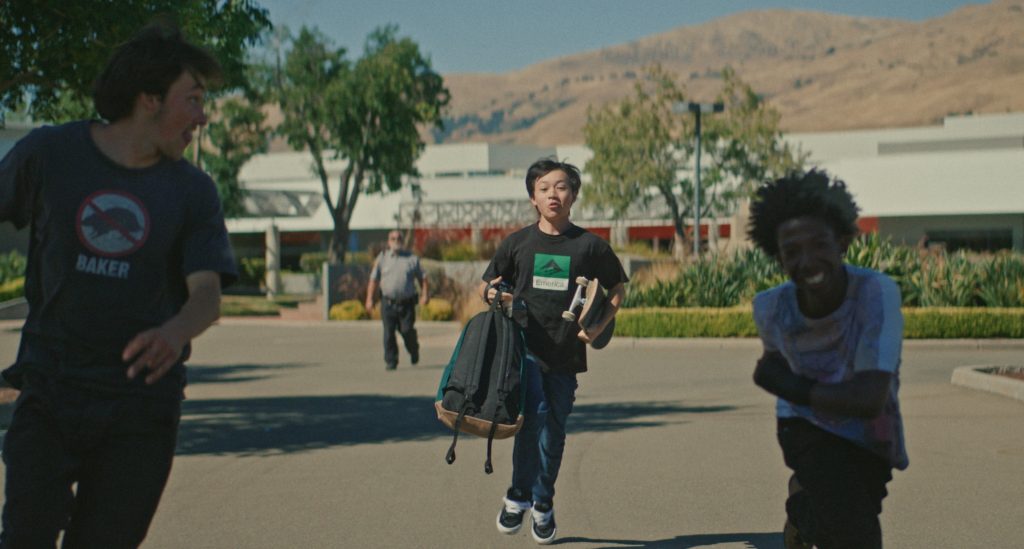
I’m curious about how 2008 was a character for you and sort of what was important about actually expressing that through your script?
Everything with this movie… it really went back to the personal. [I thought], “What was my life like when I was 13? I was 13 in 2008…” Being a child of immigrants? An Asian kid in a sea full of a lot of Asian kids? He has a very diverse friend group in this movie, and yet, he still doesn’t quite feel like he belongs. That was something that I felt like was specific to the world that I grew up in, sort of being an outsider among outsiders.
The internet was the biggest signifier of the 2008 timestamp. All of the movies about teenagers that were made in the late 2000s that are set in the 2000s never cut to screens, they never incorporate the internet. Filmmakers say the internet is inherently uncinematic, and a lot of movies and storytellers work around the internet… The internet I remember growing up, it felt a little bit more innocent and naive, and… It was a pre technology era… It was a transitional period in our collective relationship with technology that never was accurately captured. By the time filmmakers knew how to capture it, the technology had completely changed. It felt like what was personal was also an opportunity to revisit and hopefully do something that felt fresh and unique.
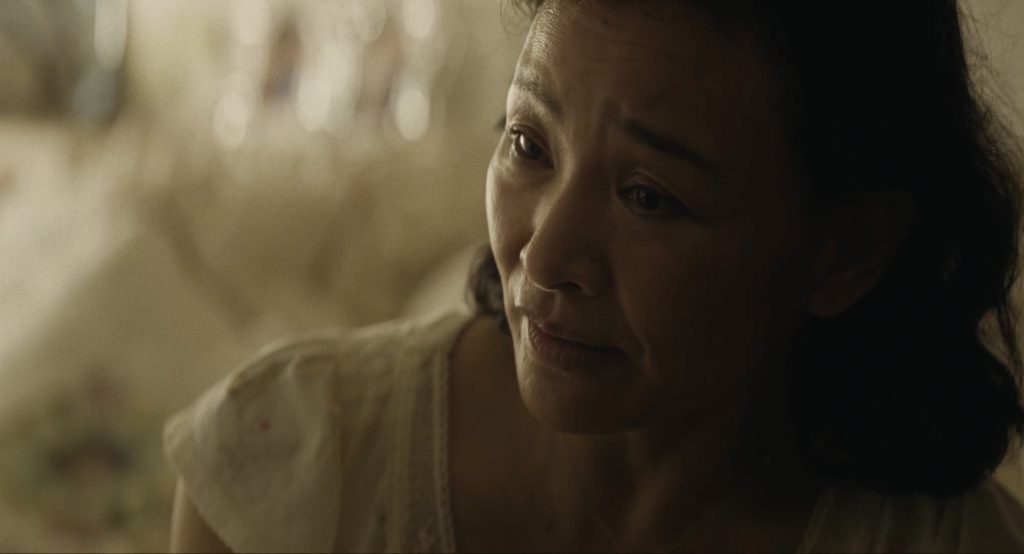
The script took seven years for you to write. Could you actually share a time when you felt it wasn’t gonna happen, like that is an obstacle for you, but yet somehow the universe gave you what you needed to continue on?
I started writing the script when I was 22 or 23, and I had the privilege of having older filmmaker friends look at it. I love looking at old filmmakers and studying their careers and how they kind of got things made. I remember two things: 1) I had a lot of friends who were kind of cutting their teeth on shorts and commercials and music videos. They had feature ambitions, and then they got the chance to make a feature, and they had never really spent the time to write anything because they were cutting their teeth on shorts. They got a feature opportunity, but they didn’t spend any time developing a script. It was like jumping at the opportunity. What I learned from afar, and now that I’ve made a feature, is that problem solving is exponential. If you don’t solve it in the script, you’re going to run into problems in production. If you don’t solve it in production, you’re going to run into problems in post. So if you rush a script, you’re kind of trying to fix it in every stage. They spend 2-3 years making the movie and it just isn’t that good because it’s rushed. I don’t want to fall into that trap. So I was like, while I make my shorts, I’m going to just chip away at this script…
Even though I’ve never made a feature film before, if you like this script, I’m clearly the right director for this. You’re not gonna go find another director to make this movie… If I got stuck or if I got writer’s block, I would just go work on a short or go back to Google and make commercials, and then I would jot down notes… Then, I’d be like: “Let’s go back and write.”
We spent a year trying to get it off the ground while continuing to work on the script, and everybody said: “No.” Everybody said: “We loved it, but it’s also too small for our company.” I was like: “What does that mean, just give us your leftover money! If it’s too small then it’s not a real problem.” Then we just started making it without any money, and I remember one day I was like, “A lot of things have to happen for this to feasibly start…” And then within 24 hours, the film gods answered our prayers, and like 80% of our financing fell into place. And then I remember being very stressed because my producers were like, “I think you’re shooting the movie this summer, there’s no looking back, better start prepping.”
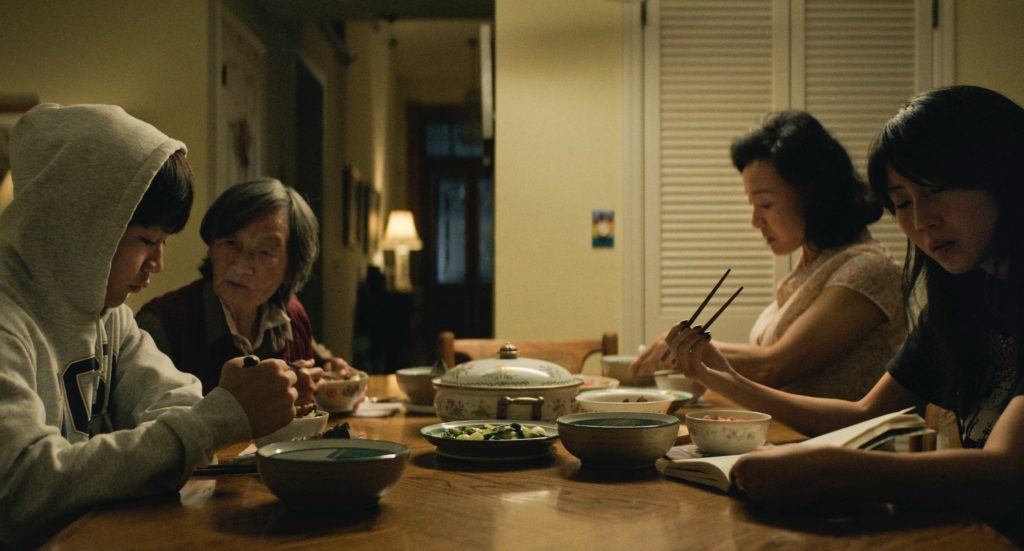
Once the panel was over, the Q&A was opened up to the audience to ask questions. Everyone that asked a question got a peach ring candy tossed to them from the stage by Wang.
You have a lot of child actors in this film. How do you direct for that – especially with like a lot of the tougher shots with children?
I wanted kids that felt like me and my friends when I was growing up… Like when I watched Stand By Me and those kids felt so raw and authentic and they don’t feel like child actors. All of the kids, minus the leads in the movie, had never acted before. They were found at skate parks and basketball camps and middle schools. Some saw our open casting call on Instagram or TikTok and just submitted a tape. All their tapes were like: “Yo, wassup, I’m Raul. I don’t know, this is my dog. Alright, peace.” Those were the kids we’re kind of looking for. Like they weren’t trying to impress you. For me, it was really just trying to tap back into this 14-15 year old self.
I showed them this is what the language of the movie is… “You can curse.” We’re encouraging them to be a version of themselves. We didn’t want them to be a version of themselves with their parents or teachers. “You know what it’s like to be a teenager with your friends, bring that to our movie.” Let them translate whatever this is that we’re doing on the computer onto set, we’re gonna be okay. Even if the movie sucked, these kids have to have a good time, they have to have fun.” (Everything on set was catered to the kids. The crew was young, music was blasted, churro machine, talent show.)
The family dynamic of the movie was beautiful. How were you able to make unique storylines for characters while also making a cohesive storyline for the family?
We have character sheets for each character. Pages and pages of backstory. We tried to flesh out the characters as much as possible, even if it’s not in lines directly on the page. We tried to give as much material to the actor so that it doesn’t just feel like they exist in the scenes, but they really exist in the movie. I made playlists for every character. I wrote backstories and facts separate from the story… It was a combination of doing as much as they could on the page and then trying to give the actors as much material that they could just sink their teeth into whether it was like in the script or not.
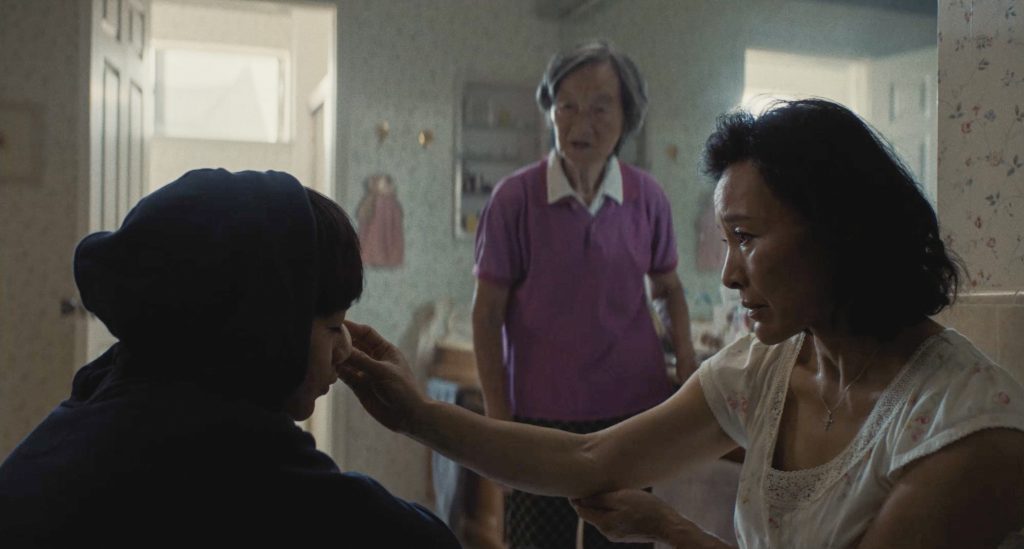
When writing the script, I was wondering how throughout the movie there were a lot of moments where you’re just like: Oh no! 🙁 How was it like writing that and like trying to pick up memories where you just remember, “Oh that was just really cringy,” especially when it’s something like: “I don’t really wanna share this with people.”
I think the theme of this movie is shame and how shame manifests itself in a young Asian-American boy’s life, and how those different versions of shame – whether it’s personal shame, cultural shame, societal shame – all kinda manifests in different emotions like fear and loneliness or sadness. All of that prevents him from accepting different forms of love, whether it’s love from his family, his mom, self love…
We talked a lot about the difference between embarrassment and shame. Embarrassment is all the cringy stuff that’s really funny and can mine for comedy, like the “how to kiss” stuff, it’s embarrassing but it’s not shameful. [Then the question is]: What is the stuff that he feels ashamed about?… It really was trying to find moments that were like starting with something real, but then wondering how we can continue to twist the dagger on Chris and make him feel more out of place and more out of place and more out of place? I didn’t think: “What are people going to think of me?” By that point, Chris was a vessel to serve the themes of the story. That being said, there are some embarrassing things in there. I guess people are gonna think I peed in my sister’s lotion or something.
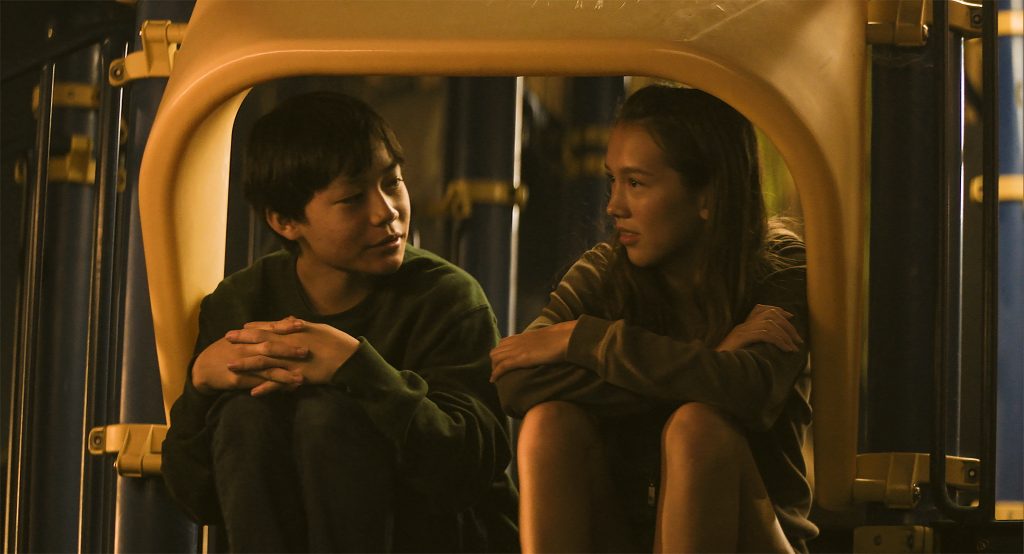
Getting the opportunity to watch this movie and panel knowing I had to write about this was such a great experience. I usually watch movies and just enjoy what I see. But it was different with Dìdi. And even if I didn’t have to write about it, the movie worked in a way where you are forced to think deeper about it. You connect with the family on a deeper level and place yourself in the different shoes of the characters. You cringe at the decisions and feel sympathy and anger in moments where the characters feel the opposite. Dìdi has easily become one of my favorite movies now because of Sean Wang.



